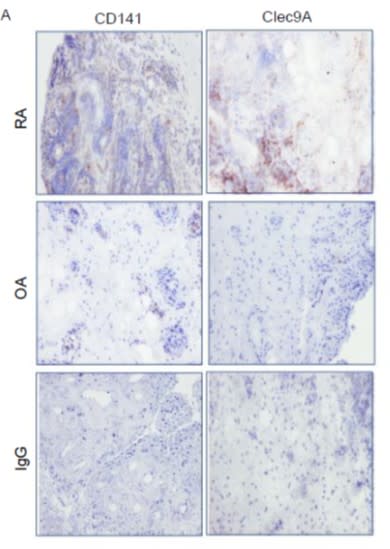Cat. #151707
Anti-CLEC9A [8F9]
Cat. #: 151707
Sub-type: Primary antibody
Unit size: 100 ug
Availability: 3-4 weeks
Target: Human DNGR1
Class: Monoclonal
Application: FACS ; IHC ; FACS ; IF
Reactivity: Human
Host: Mouse
£300.00
This fee is applicable only for non-profit organisations. If you are a for-profit organisation or a researcher working on commercially-sponsored academic research, you will need to contact our licensing team for a commercial use license.
Contributor
Institute: Cancer Research UK, London Research Institute: Lincoln's Inn Fields
Tool Details
*FOR RESEARCH USE ONLY (for other uses, please contact the licensing team)
- Name: Anti-CLEC9A [8F9]
- Research fields: Immunology;Stem cell biology
- Clone: 8F9
- Tool sub type: Primary antibody
- Class: Monoclonal
- Conjugation: Unconjugated
- Strain: Balb/c
- Reactivity: Human
- Host: Mouse
- Application: FACS ; IHC ; FACS ; IF
- Description: Recognises human DNGR-1, also known as CLEC9A, which is a highly specific marker of a human DC subset, as well as a receptor able to recognise a preformed signal exposed on necrotic cells.
- Immunogen: RBL-2H3 cells expressing human DNGR-1 fused to an HA epitope
- Isotype: IgG2a
- Myeloma used: Sp2/0-Ag14
- Recommended controls: Mouse IgG2a isotype-matched control mAbs
Target Details
- Target: Human DNGR1
- Tissue cell line specificity: Mouse IgG2a isotype-matched control mAbs
- Target background: Recognises human DNGR-1, also known as CLEC9A, which is a highly specific marker of a human DC subset, as well as a receptor able to recognise a preformed signal exposed on necrotic cells.
Applications
- Application: FACS ; IHC ; FACS ; IF
Handling
- Format: Liquid
- Concentration: 1 mg/ml
- Unit size: 100 ug
- Storage buffer: PBS with 0.02% azide
- Storage conditions: -15° C to -25° C
- Shipping conditions: Dry ice
References
- Poulin et al. 2010. J Exp Med. 207:1261-71. [PMID: 20479117]
- Sancho et al. 2008. J Clin Invest 118:2098-110 .[PMID: 18497879]
- Sancho et al. 2009. Nature. 458:899-903. [PMID: 19219027]
- Canavan et al. 2018. JCI Insight. 3(23):. PMID: 30518680.





